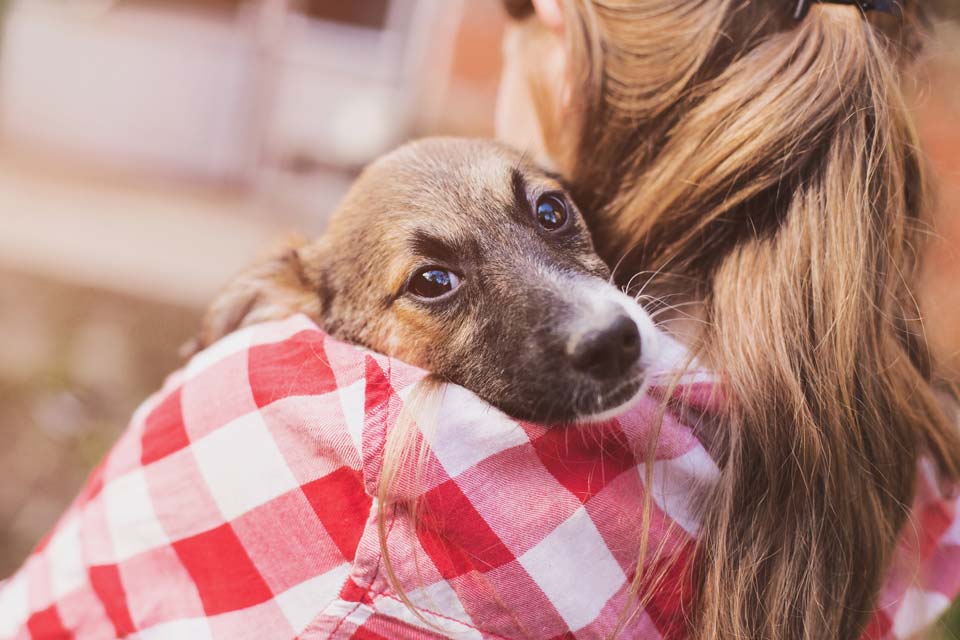How to Help Your Dog Deal with Grief

When a human, canine, or feline family member is lost, the grief can be overwhelming to the remaining family members. While you know that you and the other humans in your home will experience varying degrees of sadness and grief, you should know that your dog can have trouble understanding and getting through it too.
Signs of Grief in Dogs
Researchers in Australia and New Zealand (Jessica K. Walker, 2016) asked owners who had recently lost a pet about the behaviors of their remaining dogs, and they found there can be a wide variety of potential responses, including:
- Changes in sleeping or eating patterns
- Disinterest in regular activities like play and walk times
- Hanging out in the deceased pet's favorite spots
- Clinginess or more demanding behaviors
- Self-isolation or reluctance to socialize
- Increased frequency or volume of vocalizations
There can be as many ways for a dog to show grief as there are for humans. Watch for any change in behavior.
Give Understanding and Support
Try to give your grieving dog what she seems to need. For example, if she is clingy, give her some extra attention. If she wants to be alone, respect that, but make sure she's eating, drinking, and eliminating normally.
If your dog seems quite depressed and isn't interested in engaging in her usual activities, have her checked out by a vet to make sure a medical problem isn't coinciding with the grief. If all is well, give your dog some space, but try to encourage her to get back to enjoying the things she once did. Make regular efforts to get her to play, go for walks, or otherwise hang out with you.
Keep Routines as Normal as Possible
It can help your grieving dog to know that your home's normal routines are in place and she can rely on them. As much as possible, keep her feeding, walking, and play schedules the way they were before the loss.
Even if your dog doesn't want to engage in regular playing or walking at first, offer those things on her normal schedule (and add extras if you can). Over time, you should see that she begins to re-engage and settle back into her familiar routine.
If your dog doesn't eat her regular meal, pick it up and offer it again at the next meal time. If her appetite doesn't return to normal in two to three days, have a vet check her out.
Be Careful Not to Encourage Unwanted Behaviors
If your dog is dealing with her grief by engaging in negative behaviors, don't inadvertently reinforce those. For example, is she seems to be barking or howling for attention, try not to respond directly to that. Wait until she's quiet, and then shower her with extra love and petting. The reason for doing that is you don't want to reinforce a behavior that might extend past the grieving time and result in a long-term unwanted situation.
Keep Your Home as Calm as You Can
While your dog is grieving, it can help to keep things in your home as calm as possible. Try not to have any parties or schedule big home remodels. Consider using a DAP diffuser to help your dog feel more calm and peaceful.
If you're having a difficult time dealing with the death of a pet or human family member, know that you aren't alone. Getting help for your own grief process can help your remaining dog deal with it better too because she is tuned in to your emotions. Google "pet loss grief hotline" to find numbers and email addresses of people who can help you if you've lost a pet, or seek out a therapist trained in grief counseling. Your own grief journey will take time, so be kind to yourself.
These Things Can Take Time
In general, most dogs' grief symptoms improve slowly and resolve in a few months. Some dogs take longer, while others don't show any signs at all. Remember that, just like with humans, a dog's grief is individual and will follow its own path. Simply be there for love, play, attention, and support and to monitor your dog's medical condition.
Works Cited
- Jessica K. Walker, *. N. (2016, Nov.). Owners' Perceptions of Their Animal's Behavioural Response to the Loss of an Animal Companion. Retrieved from Pubmed.gov: DOI: 10.3390/ani6110068.
You May Also Like These Articles:
Canine Body Language: What Is Your Dog Saying?
Dogs Are More Expressive When Humans Are Watching Them
Let Sleeping Dogs Lie and They'll Learn Better
What Your Dog's Tail Can Tell You
How to Introduce Dogs and Children
Use Your Voice and Body Language to Make Your Dog Happy
Disclaimer: This website is not intended to replace professional consultation, diagnosis, or treatment by a licensed veterinarian. If you require any veterinary related advice, contact your veterinarian promptly. Information at DogHealth.com is exclusively of a general reference nature. Do not disregard veterinary advice or delay treatment as a result of accessing information at this site. Just Answer is an external service not affiliated with DogHealth.com.
Notice: Ask-a-Vet is an affiliated service for those who wish to speak with a veterinary professional about their pet's specific condition. Initially, a bot will ask questions to determine the general nature of your concern. Then, you will be transferred to a human. There is a charge for the service if you choose to connect to a veterinarian. Ask-a-Vet is not manned by the staff or owners of DogHealth.com, and the advice given should not delay or replace a visit to your veterinarian.



